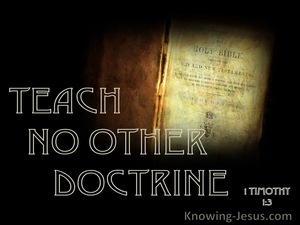◄ 1 Timothy 1 Devotional Commentary ►
1 Timothy 1:1
An apostle is one who is sent; and in almost all of his epistles, Paul is very clear about the legitimacy of his calling, identifying himself as an apostle of Jesus Christ. Paul was personally called and commissioned by the risen, ascended, and glorified Lord Jesus, while journeying to Damascus.
Paul, like the other apostles of Christ, was divinely appointed by God, and many like Paul were also commissioned to write certain read more...
1 Timothy 1:2
This letter is written personally to Timothy, whom Paul addressed as 'my true son in the faith'. Timothy was not Paul's physical offspring, but was either led to faith in Christ Jesus by Paul personally when he visited Lystra, or had been nurtured and discipled by the older apostle. Timothy was a man who knew the Scriptures well, having been taught them from infancy by his grandmother Lois and mother Eunice, as well as accompanying Paul on some of his read more...
1 Timothy 1:3
After his short introductory remarks to Timothy, Paul reminded his 'son in the faith' of some earlier advice he gave him on carrying out his pastoral duties in Ephesus, and the importance of addressing any strange doctrines that had been brought into the congregation.
Not only is Paul's epistle a personal letter to a spiritual son, encouraging Timothy to be faithful, to stand firm in the faith, to communicate the truth of the read more...
1 Timothy 1:4
When Paul bid Timothy farewell and departed to Macedonia, he urged his beloved 'child-in-the-faith' to remain in Ephesus. He charged him to correct the various false teachings and strange doctrines that were springing up and infiltrating the Church, because of their detrimental effect on the spiritual growth of believers.
This letter to Timothy was written to reinforce the instructions he had received earlier, and this verse read more...
1 Timothy 1:8
It must have been encouraging for Paul to see Timothy, his young 'son-in-the-faith' being sufficiently established in his Christian life to be entrusted with pastoring the recently established Church in Ephesus. In this first epistle to Timothy, Paul balances the encouragement and edification he gives, with some necessary warnings about teachers of the Law, who have deviated from the truth, while setting him the task to correct any erroneous doctrine.
read more...
1 Timothy 1:10
As an apostle of Christ Jesus according to the commandment of God, Paul set out the pure doctrine of Christianity in both his 'church' epistles, and the letters he sent personally to Timothy and Titus who were his true 'children in the faith'.
Doctrinal purity was of vital importance in those early days of Christendom, and remains of great read more...
1 Timothy 1:15
A faithful and trustworthy saying in the Word of God is a faithful FACT. It is a trustworthy TRUTH upon which we can build our life. It is a factual saying that will stand the test of time; a reality given to us by God Himself. A faithful and trustworthy saying is a dependable doctrine and a certain creed upon which to rest.
"Christ Jesus came into the world to save sinners," is a faithful and trustworthy saying. It is a read more...
1 Timothy 1:17
What a beautiful and comforting description of our God and Father. He is the eternal, immortal, invisible King of the ages, the Ruler of time, the Sovereign of eternity, the Governor of the earth, and the Creator of the universe. He neither sleeps nor grows weary, upholding all with the might of His power. He is in full control of all that was, and is, and is to come, for He knows the end from the beginning and has scheduled every day of our lives.
read more...
1 Timothy 1:19
God is gracious and does not force His love on unbelievers. He gave His only begotten Son to die for them, and those who believe (those who exercise faith) are not condemned. Those who do not believe (those who do not exercise faith) are condemned because of their unbelief. It is ONLY the believer who is instructed to "cling to your faith in Christ, and keep your conscience clear." Those who have never trusted Christ as Saviour are unbelievers - read more...








